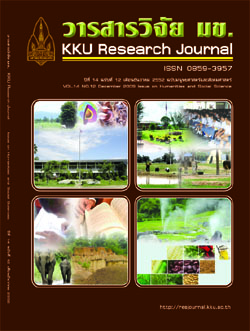In-depth study of geology teachers' teaching practices in the upper secondary levels under the Bangkok Educational Services, area 2
Main Article Content
Abstract
This research is an interpretive study which aims to determine in-depth understanding of geology teachers' teaching practices in the upper secondary levels. Three teachers from three different public schools participated in the study. Data were gathered from semi-structured interviews, classroom observations, and other related documents. Inductive analysis was utilized to manipulate empirical data and categorized into significant themes. Findings revealed that teachers were more likely to rely on lectures, using worksheets, and searching for information for classroom presentations, but less likely to use hands-on experiments. Teachers used a variety of teaching and learning materials depending on time and facilities. Moreover, they assessed and evaluated students' learning using several methods. Concerning the integrated curriculum, teachers usually interconnected geology contents with other disciplines while integration within science disciplines was barely used in the classroom. The findings are available for use for designing professional development through collaborative action research in order to promote teachers' teaching practices.
Article Details
References
Berlin, D. F. and Hillen, J. A. 1994. Makingconnections in Math and Science: Identifyingstudent outcomes. School Science andMathematics 94(6): 283-290.
Fogarty, R. 1991. The mindful school: how tointegrate the curricula. Illinois: SkylightTraining and Publishing.
Green, L. C. 1991. Science-centered curriculum inelementary school. Educational Leadership49: 42-46.
Hewson, M.G. and Hewson, P. W. 2003. Effect ofinstruction using studentsû prior knowledgeand conceptual change strategies on sciencelearning. Journal of Research in ScienceTeaching 40(1): 86-98.
Howes, E. V., Lim, M., and Campos, J. 2009.Journeys into inquiry-based elementaryscience: Literacy practices, questioning, andempirical study. Science Education 93:189-217.
King, C. 2001. The response of teachers to newsubject areas in a national sciencecurriculum: The case of the earth sciencecomponent. Science Education 85: 636-664.
McComas, W.F. and Wang, H. A. 1998. Blendedscience: the rewards and challenges ofintegrating the science disciplines forinstruction. School Science andMathematics 98(6): 340-348.
Revetta, F. A. and Das, B. 2002. Integrating geologyand physics to enhance science learningexperience of students and serve thecommunity. Journal of GeoscienceEducation 50(2): 150-157.
Tsai, C.-C. 2007. Teachersû scientific epistemologicalviews: The coherence with instruction andstudentsû views. Science Education 91:222-243.


